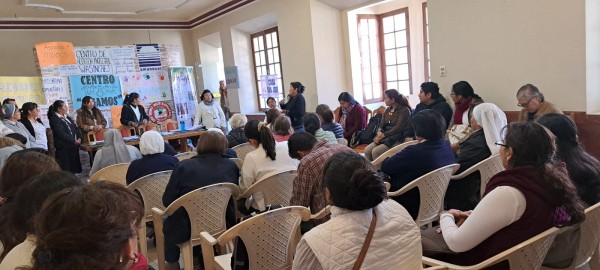
Can you imagine the value of a hug for an abandoned child? Or the hope in the eyes of a teenager who has suffered so much and is beginning to dream of a brighter future for himself? Or the simple security of a hot meal for a child who has nowhere else to eat? Well, that is the reality of Casa San José, a home run by the Community of Saint Paul, and of other 72 foster homes here in Cochabamba, Bolivia. Every day we open our doors and our hearts to the most vulnerable, giving them a ray of hope in the midst of adversity.
At Casa San José, each year we provide that hope to approximately 115 children and adolescents who are at risk of homelessness, offering them the opportunity to rebuild their lives and return to the warmth of a family. Your generosity has been a beacon on this journey, allowing us to offer them not only a roof and a livelihood, but also the possibility of dreaming of a different tomorrow. Thank you so much for your constant support, which is vital to our task!
However, a bureaucratic shadow threatens this essential work, as well as that of 72 other homes that together serve nearly 4,500 children and adolescents in the region. Incomprehensibly, the Autonomous Municipal Government of Cochabamba, instead of being an ally in the protection of vulnerable children—a responsibility conferred upon them by law—is imposing obstacles that seriously jeopardize our own sustainability. This situation affects various religious and secular institutions that manage these shelters.
Recently, the governor's office imposed the Departmental Law 1006, a regulation that, without consulting us or recognizing our altruistic dedication, unfairly equates us with for-profit companies. The direct result: costly and unnecessary procedures that undermine our autonomy and compromise the vital care we provide to the children who need it most.
We are not asking for privileges, but for justice and recognition for the work we do, fulfilling a responsibility of the State. We cannot allow our work to be hindered, jeopardizing the well-being of the children who depend on us for their protection and development. The imposition of this law could force us to make drastic decisions, including closing our doors, leaving hundreds of children and adolescents without shelter —who now find a safe and hopeful refuge in Casa San José and other foster homes.
Faced with this critical situation, we ask ourselves with deep concern: where will the children go if we cannot continue to offer them a future? At Casa San José and the other foster homes, we are standing up to fight for the repeal of this unjust law. We want to keep you informed about this crucial battle we are waging for the future of the most vulnerable. In this arduous struggle for the continuity of our work and the well-being of the children, the various organizations that manage the 73 homes have joined forces to express our deep concern to the authorities and the public. We sincerely hope that our voices will be heard and that we can establish a constructive dialogue that will allow us to reach a fair and reasonable consensus to continue helping thousands of vulnerable children. Thank you for always being by our side!
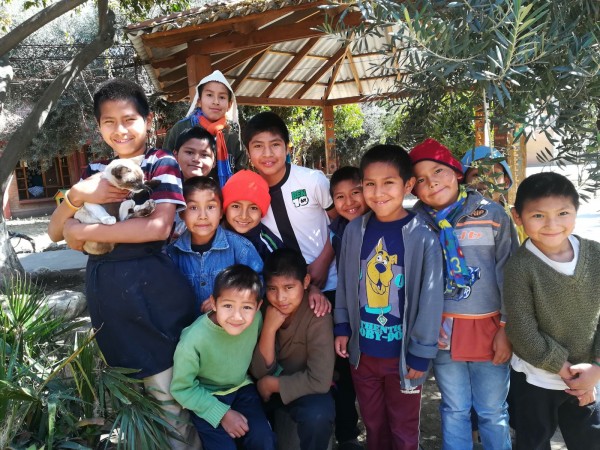
From Casa San José, in Cochabamba, we receive the story from one of the street boys who are sheltered there.
«My name is Andrés, I am 13 years old, and I live in the city of Cochabamba. Today I thought it would be a good day to tell you something that happened to me:
In one of my many trips to school, I met two children, who were brothers: Lionel, 11, and Daniel, 6. I met them there on the streets of oblivion and nostalgia, busy and noisy streets. They asked passers-by and vehicles for money, regardless of the danger they were in, although I think it was fun for them, and they did not think it was dangerous. I was carrying some food, so I stopped to rest and eat my little snack. At that moment we exchanged a few words and struck up a friendship. We spoke. They told me that their mother abandoned them, and their father did not take care of them; they were always hungry, and affection was always lacking. They spoke with great sadness and regret. So they had decided to go out into the streets to juggle and ask for money so they could buy food for themselves and their younger sisters.
That first meeting was followed by others, and with time I had many opportunities to share a little snack with them and talk about our things. But one day, I didn't find them anymore. It was as if they had disappeared.
However, my luck also changed. One afternoon after wandering the streets aimlessly, the police caught me and took me to a home called Casa San José. I did not want to go there, because I liked life on the streets, and that place was strange and unknown to me. My big surprise when I entered was to see several children playing in the yard, but what caught my attention were two boys in particular. The two who were not strangers to me. There were Lionel and his brother Daniel! I imagined they were as lucky as me and the police found them alone on the street. After bathing and putting on clean clothes, I ran to give them a big hug. And we spent the afternoon talking and telling each other about our adventures.
Lionel told me that his sisters were living in another center, although the youngest, five years old, became very ill and died of leukemia.
After a few months living in Casa San José with several children, having fun and being content and happy, Lionel told me that his father was going to come with his sisters to go all together to live at his house, the four of them. I was sad, since they would be leaving, but I was happy for them when I saw how their father hugged them. This was a hug expected by Lionel and Daniel. That day many emotions came out, so they all ended up crying.
I also missed my family. I miss them a lot. I hope that there will soon be a reunion with them, like that of Lionel and Daniel with their dad. You will ask me why I ran away, if I love my family, but this is already part of another story. My story, that perhaps one day I will tell you».
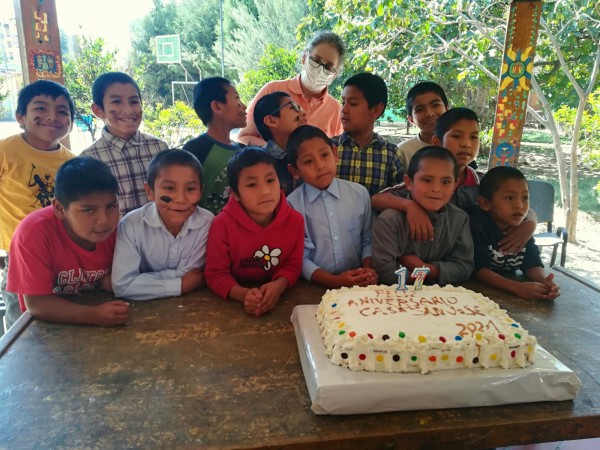
On May 1st, the team and all the children and teenagers of “Casa San José” celebrated the 17th anniversary of our home for street children. We are very proud of these seventeen years serving the most vulnerable population, seeking every day that the children and adolescents welcomed in our home regain the right to live in a family.
In all these years we have contacted more than 5,500 children on the streets of Cochabamba, and we have cared for more than 2,200 boys at our home. More than 1,100 returned to their homes and a significant number were transferred to other institutions. The Government of Bolivia, in this year 2021, has given us a recognition that reads as follows: “For their outstanding work in favor and ensuring the comprehensive development of children and adolescents in vulnerable situations, providing support, shelter, food, care and above all respect for the rights and dignity of people, for their vocation of service and contribution to human development in the department of Cochabamba, Bolivia, with an invaluable value.” This recognition honors us, but much so the memory of each one of the children, dear children of God, whom we have met. It fills us with joy and pride to have shared and made a change in many of their lives, helping them to return to their families or to join other educational institutions. Working with all of them has paid off, and we keep moving forward!
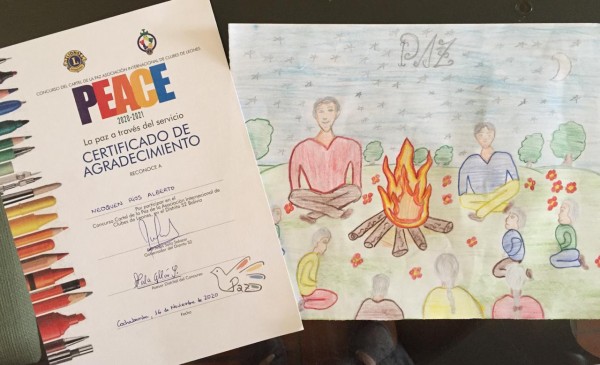
The Lion’s Club from Bolivia organized a few weeks ago the “Peace Poster” contest throughout the country, to reach out especially to boys and girls. With this contest they were interested in reaching institutionalized children, deprived of parental care, who reside in various centers, victims of violence, abandonment and street situations. One of the objectives was for these children to receive a message of peace, love and hope, generating resilience to overcome the adverse circumstances they have suffered in their lives.
The adolescents from our Casa San José participated in the contest held at the Cochabamba level for a subsequent national selection. The educators of the center helped and accompanied them to develop their artistic skills in drawing and painting, so that they could express what peace means to them.
We were pleasantly surprised when we learned that our teenagers' drawings had been selected for a showing throughout Bolivia. In this way, and with events like this, the different skills and artistic abilities of all the children and adolescents welcomed at Casa San José are reinforced, and they discover many skills that so far, perhaps due to the type of lives they experienced with their families, had not been stimulated. And, of course, they were awarded for their art and creativity. We rejoice with them!
The children in Casa San José in Cochabamba, Bolivia, have shared this video they have prepared. They wish everyone hope and strenght in the face of the pandemic.
We hope you enjoy it!
http://www.youtube.com/watch?v=4fXetdYcH68
Commemoration of the Anniversary of Casa San José in Bolivia
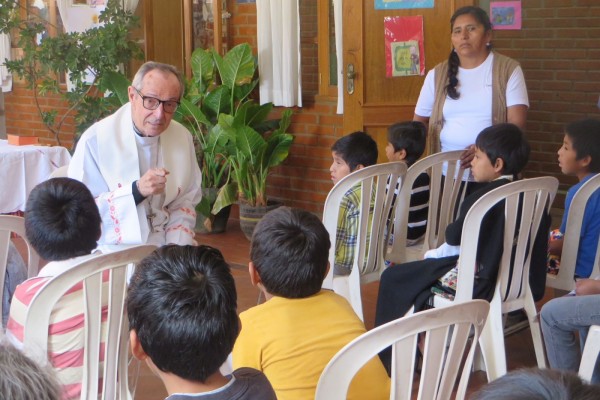
May 1, the feast of St. Joseph the Worker, is a very special day for Casa San José in Cochabamba, Bolivia: it marks our anniversary. Fourteen years ago, we opened our doors to shelter children and teenagers in vulnerable situations, especially those on the streets, so that they might live in a dignified manner. While the youth are living at Casa San José, we work with their relatives, so that reintegration of the children into their families can be successful and they will not return to the streets.
In Bolivia, there are close to 2,200 children and adolescents living in the street, more than 1,000 living in prison with their parents (who are completing penal sentences) and hundreds more who are victims of sexual violence, slavery and trafficking.
On May 1, to commemorate the 14th anniversary of the opening of Casa San José, Msgr. Tito Solari, Archbishop Emeritus of Cochabamba, joined us and celebrated the Eucharist with the 24 children and adolescents who are currently at Casa San José. It was a very beautiful, warm and joyful celebration. Bishop Solari repeated several times to the children that what God likes most about them is that the children are always smiling and happy. “Be smiling children, bearers of light, so that you may always illuminate the world. God holds you in his heart and he loves you very much,” he told them.
In “Casa San José” of Cochabamba, the Community of Saint Paul Combines Family Reintegration with Schooling for the Children
.jpg)
The goal of la “Casa San José” is the reintegration of children who are living on the streets back into their family homes. There, we have a conflict of priorities, and have recently tried to find a solution.
When the children arrive at the center, a period of intensive work begins. During this time, the psychologist, the social worker and the educators focus on all of the psychological and emotional aspects of the children, as well as their habits, behavior and discipline. This is done through several workshops, with the goal of achieving the child’s reintegration into his family. During this time children do not attend school. That is why we try to keep children at the center only for the time that is absolutely necessary. In fact, the law recognizes the importance of such a period, and the courts do not authorize formal schooling for the children during this time.
The problem begins when the children are ready to return to their families: the family’s suitability has been assessed, the parents have attended parenting classes at the center, but then, due to bureaucratic delays, the legal process takes several months —and during this time the kids cannot return home yet, and they cannot attend school either. And as the saying goes, “Justice delayed is justice denied.”
This situation worries us. Even though our top priority is to restore the family unit, it is a shame not to be able to integrate the children back into school sooner. After thinking much about this and meeting with parents, we found a solution. The families agreed to enroll their children in the schools of their respective neighborhoods, pick up their children at “Casa San José” daily, bring them to school and return them to our center in the afternoon. Even though it represents a major effort on their part, they understood that it was worthwhile to do this, so that the children would not miss a school year. In this way, we’ve been able to bring together family and school, without having to choose one or another.





.jpg)